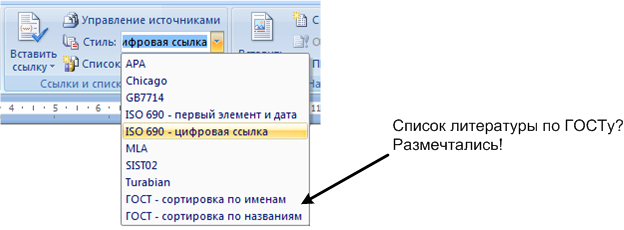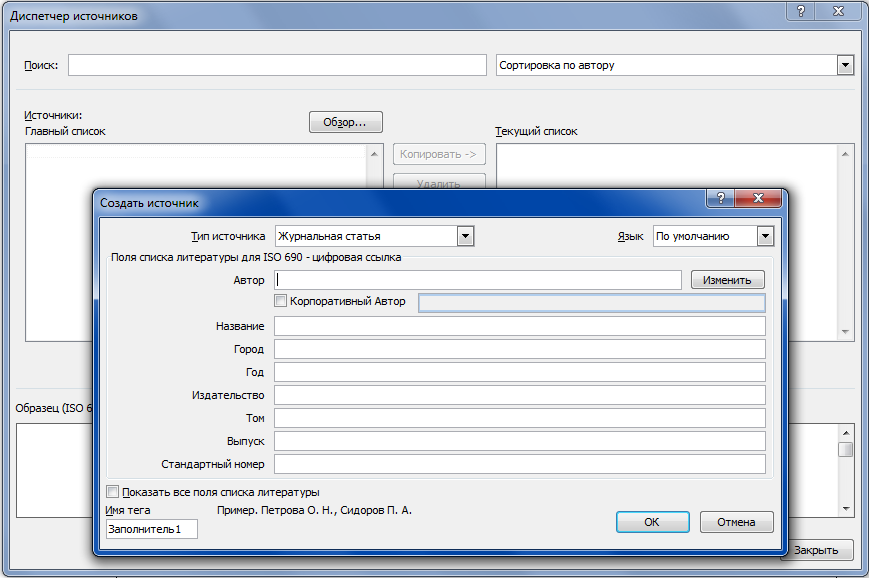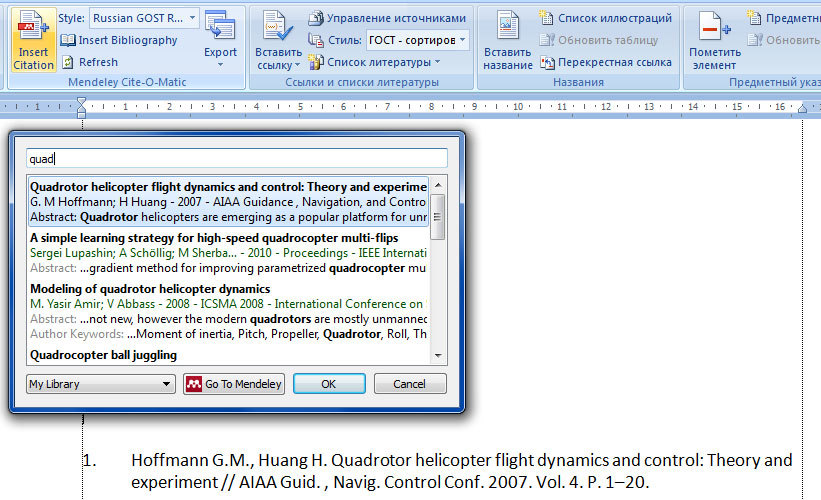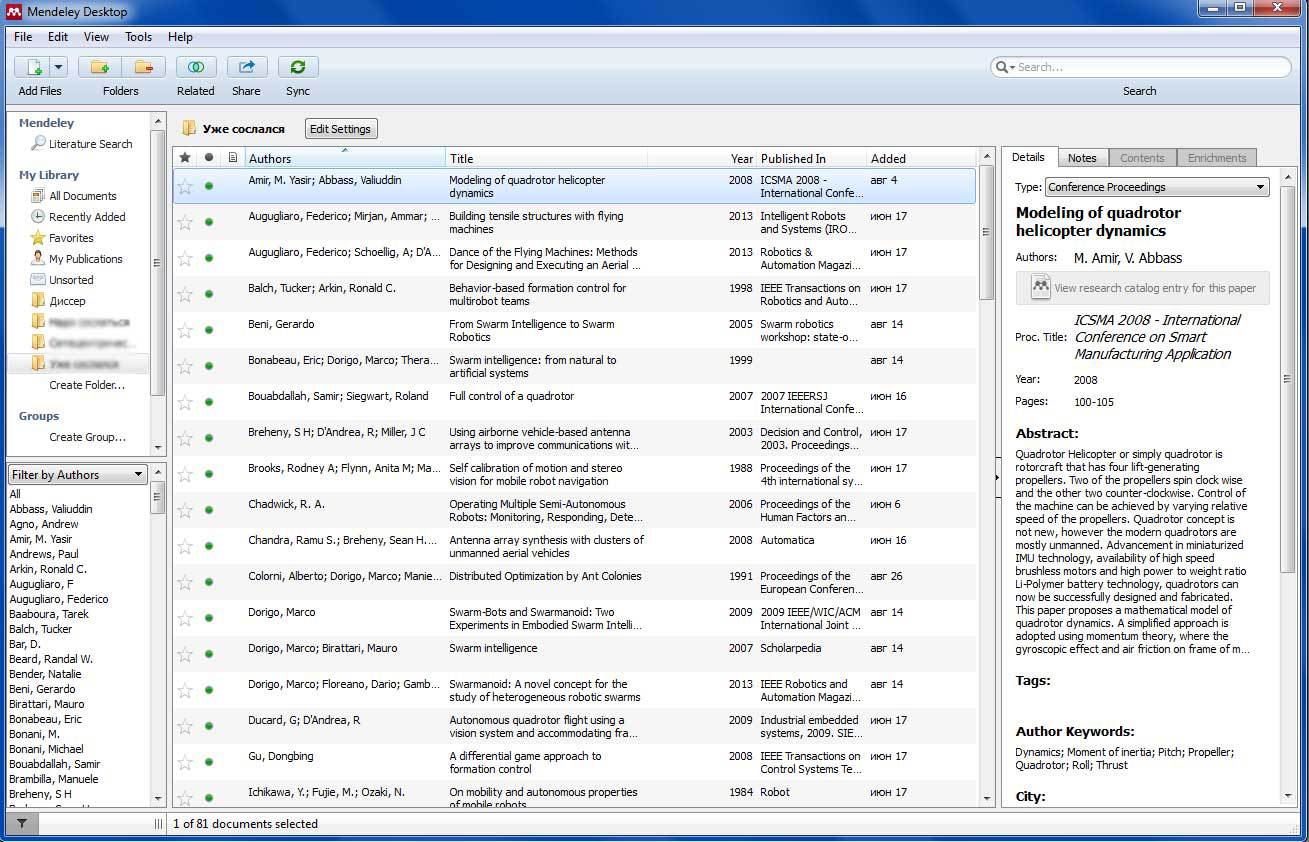Automate the creation and editing of used source lists with Mendeley
Lists of used sources have to be used quite often. Students write term papers and diplomas, undergraduates, graduate students and doctoral students write dissertations. Researchers write articles and reports and much more. I am sure that each reader at least once in his life had to compile a cited list of references and indicate references to the literature in the text.
When creating an article on the Web, you can insert hyperlinks to sources directly in the text, or add a bulleted list in the “basement” in which these sources and any literature recommended for reading will be listed in a random order. However, in the scientific community and in the educational system, strict (and sometimes contradictory) requirements are imposed on the rule for the design of such lists, and it is a dreary and ungrateful job to comply with them manually.
In this article I will share my experience in automating the creation of a list of used sources with the help of Mendeley. When writing texts, I use MS Word 2007 becausehe was better acquired by his employer. All of the following can be repeated in Open Office.
Generally, in MS Word, starting from version 2007, there is a built-in mechanism for creating references that even supports (supposedly) GOST.
')

In theory, everything is simple - you bring all the literature used in the database and then refer to it as necessary. At the end of the document have a list. Links in the right format will be scattered throughout the text. But in practice everything is more complicated. Firstly, the user needs to bring in all the literature sources used, filling in all the form fields for this.

Make a dozen works - not a small work. Fill out the base of hundreds of items - the risk of a nervous breakdown. For some reason, I didn’t find any search in the databases. However, all the works will still be in vain, because the embedded template is far from GOST. There is not even the notorious square brackets. However, the latter problem is treated by editing the template .
So, what did not suit me in Word:
Currently, I use Mendeley to create references and to place references to the literature in the text. This is not the only (and perhaps not the best) system, but it suits me and I want to share my experience of use.
Mendeley works as follows: you create your account, download and install software, and start your own source card database. It is also useful to download and install a plugin for MS Word (or Open Office).

Add a reference to the literature using the plugin for MS Word
You can also use a browser plugin, which sometimes makes it easier to add sources found on the Internet.

By dragging an item found on the network, you can get a ready-made card in Mendeley. And you can not get it. In any case - very carefully edit the cards received using the plugin in the browser.
By installing the desktop version or logging into your account through a browser, you can use the search in the database of already created cards. True, the search practically does not work with the Russian-language publications, but almost always finds foreign literature, and it is rarely necessary to make it manually. Cards found on the network can be added to yourself and edited (it is worth checking other people's cards for errors and incomplete filling - I came across cards filled with inattentive bums. In any case, editing the finished one is easier than filling it all up).

Screenshot Mendeley Decktop while running
However, even if the search on the internal database of Mendeley did not bring results, you should not rush to fill in the card manually. We go to the Google Academy and try to find the desired source there. If the source is found, then we find the link “Import to BibTeX” under it, save the object by reference as a file and open it with the Mendeley Desktop program. As a rule, we get a half-filled source card. Editing such a card is easier than manually.

An example of how you can get the finished file BibTeX through Google Academy
As for the link formatting templates and the list of references, in addition to the huge number of templates already installed by default, you can add your own. These templates are written not as a hit, but in a special “quote style language” Citation Style Language (CSL) , which in turn is based on XML.
I will not provide links to specific templates that I use in my work, as I am not sure that they are the most successful. Let me just say that the requirements of Russian scientific publishing houses, foreign publishing houses, dissertation councils, and so on, and so on, differ significantly, but so far I have managed to find a good template for each of them.
As a rule, the same sources can be used in different articles, in the thesis, scientific report, etc. Once you add it to your profile you will receive a link to it in a few mouse clicks.
Besides the fact that Mendeley allows you to easily and quickly compile a list of references, it also helps in searching for literature, allowing you to find “related articles”, as well as search by author, keywords, etc.
Filling out a Mendeley profile implies some sort of social network for researchers. There is also the possibility of teamwork, but so far I have not managed to convince my colleagues to use this system (maybe this article will help), so there is no experience of such work.
Mendeley allows you to store not only the bibliographic data of articles and their annotations, but also attach pdf-files with full text. And also download full-text versions of those articles that other members of the system have posted in open access.
You can study the functionality and interface of the system with the help of training videos and well-written (albeit in English) help .
Some flaws can be called "features", but I will not use this trick.
Mendeley can be useful to students, graduate students, scientists and indeed to anyone. Spending a little time studying this system can save a lot of nerves when working with literature lists, especially when you have to swap two subsections in a carefully verified document and manually cleaned the numbering system of links is dust.
This article does not claim to have a full and comprehensive review of the Mendeley system and is only intended to draw the attention of interested parties to the use of such automation tools. The author is personally aware of many eminent scientists (including those from the technical sciences) who are still spending precious time manually compiling a list of references.
Seven practical methods and tools to optimize the work on the thesis - one paragraph
Social network as an instrument of scientific work - common words
FAQ on Mendeley and Zotero
www.mendeley.com - official site (English language)
When creating an article on the Web, you can insert hyperlinks to sources directly in the text, or add a bulleted list in the “basement” in which these sources and any literature recommended for reading will be listed in a random order. However, in the scientific community and in the educational system, strict (and sometimes contradictory) requirements are imposed on the rule for the design of such lists, and it is a dreary and ungrateful job to comply with them manually.
In this article I will share my experience in automating the creation of a list of used sources with the help of Mendeley. When writing texts, I use MS Word 2007 because
Than to me the tools of creation of references are built in the MS Word?
Generally, in MS Word, starting from version 2007, there is a built-in mechanism for creating references that even supports (supposedly) GOST.
')

In theory, everything is simple - you bring all the literature used in the database and then refer to it as necessary. At the end of the document have a list. Links in the right format will be scattered throughout the text. But in practice everything is more complicated. Firstly, the user needs to bring in all the literature sources used, filling in all the form fields for this.

Make a dozen works - not a small work. Fill out the base of hundreds of items - the risk of a nervous breakdown. For some reason, I didn’t find any search in the databases. However, all the works will still be in vain, because the embedded template is far from GOST. There is not even the notorious square brackets. However, the latter problem is treated by editing the template .
So, what did not suit me in Word:
- The need to manually fill in a huge number of fields for each publication
- Lack of a normal database with already filled literature cards
- The need to edit the formatting template manually at your own risk (and what if the software is updated and my edits will lead to loss of performance?)
Mendeley in brief
Currently, I use Mendeley to create references and to place references to the literature in the text. This is not the only (and perhaps not the best) system, but it suits me and I want to share my experience of use.
Mendeley works as follows: you create your account, download and install software, and start your own source card database. It is also useful to download and install a plugin for MS Word (or Open Office).

Add a reference to the literature using the plugin for MS Word
You can also use a browser plugin, which sometimes makes it easier to add sources found on the Internet.

By dragging an item found on the network, you can get a ready-made card in Mendeley. And you can not get it. In any case - very carefully edit the cards received using the plugin in the browser.
By installing the desktop version or logging into your account through a browser, you can use the search in the database of already created cards. True, the search practically does not work with the Russian-language publications, but almost always finds foreign literature, and it is rarely necessary to make it manually. Cards found on the network can be added to yourself and edited (it is worth checking other people's cards for errors and incomplete filling - I came across cards filled with inattentive bums. In any case, editing the finished one is easier than filling it all up).

Screenshot Mendeley Decktop while running
However, even if the search on the internal database of Mendeley did not bring results, you should not rush to fill in the card manually. We go to the Google Academy and try to find the desired source there. If the source is found, then we find the link “Import to BibTeX” under it, save the object by reference as a file and open it with the Mendeley Desktop program. As a rule, we get a half-filled source card. Editing such a card is easier than manually.

An example of how you can get the finished file BibTeX through Google Academy
As for the link formatting templates and the list of references, in addition to the huge number of templates already installed by default, you can add your own. These templates are written not as a hit, but in a special “quote style language” Citation Style Language (CSL) , which in turn is based on XML.
I will not provide links to specific templates that I use in my work, as I am not sure that they are the most successful. Let me just say that the requirements of Russian scientific publishing houses, foreign publishing houses, dissertation councils, and so on, and so on, differ significantly, but so far I have managed to find a good template for each of them.
General algorithm for using the Mendeley system
- Register, download software, install plugins
- We create the necessary folders (for example, "Course", "Diploma", "Scientific Report", etc.) at will
- We are looking for the necessary literature in the search and drag the necessary cards into our folder.
- If something was not found in Mendeley, we search in Google or anywhere else, open the saved BibTeX files and add to our folder
- Check the correctness of the found cards
- If there is nothing anywhere - we create a new card and fill it out manually, at will / need we attach the file of the article itself.
- Open the text of our future work in MS Word / Open Office and add links in the right places, select the list formatting template and add a list of sources at the end of the document
- Carefully review the list of sources. If something went wrong, edit the source cards, or edit / discard the template and look for / write a new
- We rejoice at the result
As a rule, the same sources can be used in different articles, in the thesis, scientific report, etc. Once you add it to your profile you will receive a link to it in a few mouse clicks.
Mendeley as a literary search assistant
Besides the fact that Mendeley allows you to easily and quickly compile a list of references, it also helps in searching for literature, allowing you to find “related articles”, as well as search by author, keywords, etc.
Filling out a Mendeley profile implies some sort of social network for researchers. There is also the possibility of teamwork, but so far I have not managed to convince my colleagues to use this system (maybe this article will help), so there is no experience of such work.
Mendeley allows you to store not only the bibliographic data of articles and their annotations, but also attach pdf-files with full text. And also download full-text versions of those articles that other members of the system have posted in open access.
You can study the functionality and interface of the system with the help of training videos and well-written (albeit in English) help .
Other useful features of Mendeley
- The presence of a plug-in for Open Office (I personally did not check its performance)
- The ability to customize a lot of things besides the styles of references (for example, the order of storing files on disk)
- Ability to integrate with similar systems, primarily Zatero
- You can store cards of your own publications and hope that other users of the system will find them when searching by keywords, use, refer and increase your citation index
- There is a version of Mendeley Desktop not only for Windows, but also for Linux and MacOS
- There is a mobile application for IPhone
- API published
Disadvantages of mendeley
Some flaws can be called "features", but I will not use this trick.
- Search in literature does not work with Russian-speaking sources (get ready to make them into manual)
- Even the desktop version requires an internet connection. Offline mode is not provided.
- You need to register, create your account and work with it.
- If your document contains references to 100 or more sources of literature and you have edited it (added another source, opened the link for editing), prepare for small slowdowns of MS Word
- Free account features are limited: the storage capacity of full-text versions of articles, the number of working groups and the number of group members. (However, I do not attach pdf-files to all articles with which I work, and I keep most of them separately, which allows you to freely use a free account)
- No application for Android and other non-Apple mobile platforms
Conclusion
Mendeley can be useful to students, graduate students, scientists and indeed to anyone. Spending a little time studying this system can save a lot of nerves when working with literature lists, especially when you have to swap two subsections in a carefully verified document and manually cleaned the numbering system of links is dust.
This article does not claim to have a full and comprehensive review of the Mendeley system and is only intended to draw the attention of interested parties to the use of such automation tools. The author is personally aware of many eminent scientists (including those from the technical sciences) who are still spending precious time manually compiling a list of references.
Other references Mendeley on Habré:
Seven practical methods and tools to optimize the work on the thesis - one paragraph
Social network as an instrument of scientific work - common words
You can also read on other resources:
FAQ on Mendeley and Zotero
www.mendeley.com - official site (English language)
Source: https://habr.com/ru/post/236559/
All Articles